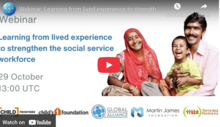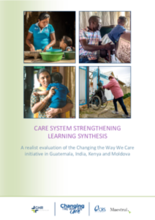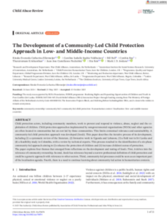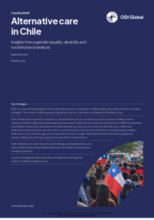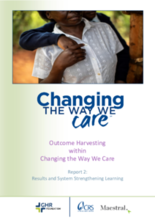This page contains documents and other resources related to children's care in the Americas. Browse resources by region, country, or category.
Displaying 21 - 30 of 3188
This webinar showcased the learning from Strengthening the Social Service Workforce for Family-Based Care, a two-year project implemented by the Global Social Service Workforce Alliance, with technical support from Child Frontiers, under a grant f
This report presents findings from an evaluation by Changing the Way We Care (CTWWC) that used a realist approach to examine how care reform progressed in Guatemala, India, Kenya, and Moldova across five key system components. It identifies advocacy, government ownership, collaboration, and capacity-building as major drivers of change and offers recommendations for governments and partners to embed family care in national systems, strengthen coordination and workforce capacity, and sustain reforms through evidence, shared learning, and long-term commitment.
This paper outlines the development of a community-led child protection approach (Seeds), created through a multi-stage process involving a systematic literature review, formative research in Uganda and Lebanon, a field test in Sri Lanka, a feasibility study in Colombia, and expert review, resulting in a six-phase model designed to strengthen children’s protection and their sense of safety.
The piece argues that while the U.S.
El artículo de Contraeditorial presenta una entrevista con Dana Borzese, directora de Doncel, quien advierte que Argentina atraviesa un momento crítico para las infancias debido al desmantelamiento de las política
Changing the Way We Care (CTWWC) is a global initiative which promotes safe, nurturing family care for children.
This Reuters article reports that the Trump administration is offering unaccompanied migrant children in U.S. custody a one-time stipend of US $2,500 to voluntarily return to their countries of origin.
This brief analyses the state of alternative care for children in Chile, highlighting key statistics, sectoral findings and areas for policy improvement. It is part of a broader analysis of gender equality, disability and social inclusion (GEDSI) in Chile. The analysis draws on existing literature, government reports and key informant interviews (KIIs) with stakeholders working in this area.
At the close of the Changing the Way We Care (CTWWC) The Changing the Way We Care (CTWWC) initiative launched in 2018 with the aim to reform child care systems by promoting safe, nurturing family-based care over institutional ca


